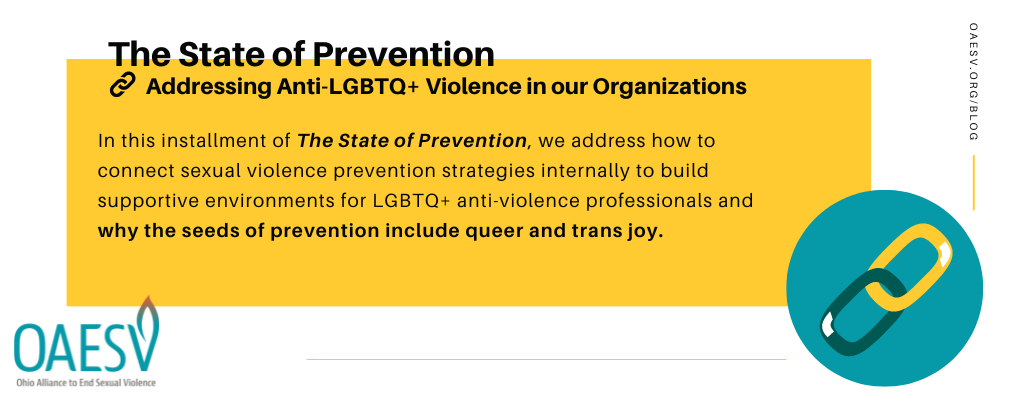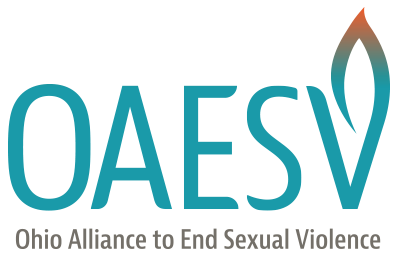
Planting the Seeds of Prevention for All: Addressing Anti-LGBTQ+ Violence in our Organizations
Today my heart hurts. It is the same low thrum of pain that persists and spikes each time a new bill is introduced to ban gender-affirming care for youth; each time LGBTQ+ inclusive curricula are attacked; each time a gun is pointed in the direction of queer and trans joy; each time members of our communities are called “groomers” for modeling possibility beyond the binary; each time conservative protesters shut down a drag event; each time a person utters “hate the sin, not the sinner.”
The intersections at which we all survive—and thrive—are interdependent. They are reliant on our ability to care for one another in layers of the tangible and intangible. I cannot quantify the feelings of joy I experience in my queerness and yet I can count the moments and name the actions that have helped sustain that joy. One such example is when I can connect with other LGBTQ+ folks in the anti-violence field, amplifying queer and trans joy as a tool for liberation.
There are many things to be said of occupational identity, a state of closely identifying with one’s profession, and it is especially true of those who work in sectors of “social good.” How we manage our occupational identity is important to sustaining in professional positions, but what might it mean to address the structures in which we ask those most impacted by the socio-political landscape to continue to work in and be harmed by?
There have been at least 124 attacks on drag events in 2022, with the most recent violent events taking place at Club Q in Colorado Springs, CO, and an LGBTQ+ inclusive church in Columbus, OH. These are acts of sexual violence, targeting those in the queer and trans communities based on their perceived sex or gender. While this is not new discrimination, the rates at which they are occurring have come to a fever pitch.
Primary sexual violence prevention asks us to stop the violence before it starts. How can we ask queer and trans folks, especially those who experience multiple forms of systemic oppression, to stop the very violence that is also perpetuated by the organizational structures of the sexual violence prevention field?
When there are external messages of support to communities impacted by incidents of violence in organizational newsletters and on social media platforms while staff members who are part of those communities are left without support internally, we perpetuate the very violence we claim to denounce. We expect people in the field to show up as their “whole selves” without the whole person care needed to be anything other than a “professional,” synonymous with white dominant, cis-heteronormative, ableist, capitalist culture committed to outcome measures.
We must do better as a field to understand the interconnectedness of protective factors that minimize the impacts of all violence on our communities and the practical, emotional, and professional support within our organizations that build those very protective factors to minimize violence against our trans and gender non-conforming (TGNC) colleagues.
Sexual violence prevention requires us to recognize risk factors for the perpetration and victimization of violence, including how our own organizations uphold oppressive structures, and proactively develop protective factors to prevent said violence. This is not solely the work of those most impacted. This is the responsibility of those who call themselves allies to intervene in meaningful ways, especially those who hold positions of power, to materially support. Like violence, burnout is not an individual issue—it is a systemic one.
To engage in violence prevention within our own organizations and across the professionalized anti-violence field, we must move beyond consciousness-raising—or increasing awareness—and commit to actively addressing the violence that drives advocates on the margins out of this work. Below is a non-exhaustive list of ways to tangibly enact actionable strategies to prevent the internal perpetuation of violent behavior mirrored in our lives and the news all around us.
For Allied Leadership
- Prioritize acknowledging the incident in a timely and intentional approach internally before external messaging is shared with no expectation for staff to engage;
- Provide a formal invitation—not suggestion or encouragement—for staff to take the day off no questions asked;
- Coordinate with supervisors of staff taking time off to push project deadlines and reschedule meetings;
- Offer a specific and timely meeting dedicated to holding space for your staff with no agenda and no hard start and end times;
- Explicitly offer an opt-out feature for organizational grieving spaces with an option to use that time as individual staff members see fit;
- Encourage staff who are most directly impacted to meet with one another outside of all-staff spaces;
- Include clear guidance for how to track these organizational and self-care hours on timesheets that don’t require self-disclosure;
- Address organizational hierarchies and who holds positions of structural influence;
- Review your benefits policies and ensure that gender-affirming care is included in the coverage;
- Proactively allocate funds for mental health stipends and self-care days that require minimal reporting or surveillance of fund usage;
- Provide staff opportunities for organizational and leadership feedback in various modalities and with levels of anonymity with a plan to implement changes meaningfully;
- Identify your own boundaries, needs, and areas of growth as a leader;
- Pod-map to identify peers and resources you can turn to for emotional support, to provide feedback, and to hold you accountable for missteps. This is critical to addressing unintentional harm that may be caused in these processes and preventing future harm from happening.
For Allied Supervisors
- Explicitly check in with all supervisees in a timely fashion and name what you intend to talk about so they can choose to attend or forego based on their own needs;
- Check calendars of supervisees and come ready with a list of tangible ways to lighten their workload, e.g., complete grant reporting, push project deadlines;
- Proactively build out a delegation framework with supervisees and use this framework to guide both regular staff empowerment and crisis management tools;
- Implement strategies during onboarding and team meetings to best understand supervisee needs and responses during times of crisis;
- Advocate for organizational policy and procedure changes when they are causing harm through omission or missteps in addressing oppressive structures;
- Engage in timely accountability processes with leadership when harm has happened through inaction or missteps in response;
- Provide supervisee opportunities for supervision feedback in various modalities and with levels of anonymity with a plan to implement changes meaningfully;
- Identify your own boundaries, needs, and areas of growth as a supervisor;
- Pod-map to identify peers and resources you can turn to for emotional support, to provide feedback, and to hold you accountable for missteps. This is critical to addressing unintentional harm that may be caused in these processes and preventing future harm from happening.
For Allied Staff Members
- Be mindful of the space you take up in shared gatherings when the current event is not directly impacting you;
- Speak up! Tell your supervisor—or leadership depending on your comfort and relationship— that you’re concerned about how a current event may be impacting your colleagues;
- Let your supervisor know what capacity you may have to take on extra tasks on behalf of impacted colleagues;
- Advocate for changes in organizational policies and procedures that perpetuate oppressive structures;
- Identify your own boundaries, needs, and areas of growth as a trusted colleague;
- Pod-map to identify peers and resources you can turn to for emotional support, to provide feedback, and to hold you accountable for missteps. This is critical to addressing unintentional harm that may be caused in these processes and preventing future harm from happening.
Primary prevention requires of each of us the ability to see the issue and recognize it as such. It requires of us to use that recognition for strategies of intervention to stop violence from happening. It requires of us to understand our own privileges and oppressions that may limit safe intervention for all involved, ensuring that the targeted person or group is centered in that decision-making. And it requires of us to check in with those targeted and offer actionable support, as introduced above. Because as gender non-conforming and transfeminine writer and performance artist, Alok Vaid-Menon, reminds us: Transphobia is hurting you, too.
When we speak the names of those who lost their lives to ensure they are not forgotten—that the fight to survive a world that actively works to erase queer and trans existence won’t stop—but do not extend that reverence to our own queer and trans staff members, it becomes an extension of that erasure. It becomes an extension of that violence. It becomes an extension of deciding who survives long enough to plant seeds of prevention for all.
“The State of Prevention” is a blog series that explores Ohio’s prevention landscape, highlighting both history and current events that impact the field.
References:
GLAAD Report: Drag events faced at least 124 protests and significant threats in 2022; Mary Emily O’Hara, https://www.glaad.org/blog/glaad-report-drag-events-faced-least-124-protests-and-significant-threats-2022
Colorado LGBTQ club shooting suspect is charged with hate crimes; The Associated Press, https://www.npr.org/2022/12/06/1140897116/colorado-lgbtq-club-shooting-suspect-set-to-return-to-court
Proud Boys Shut Down a Church’s Holiday-Themed Drag Storytime for Children; Matthew Rodriguez, https://www.them.us/story/proud-boys-drag-queen-storytime-columbus
White Dominant Culture & Something Different: A Worksheet, https://www.cacgrants.org/assets/ce/Documents/2019/WhiteDominantCulture.pdf
Definitions to Help Understand Gender and Sexual Orientation; Human Rights Campaign Foundation, https://assets2.hrc.org/welcoming-schools/documents/WS_Gender_Sexual_Orientation_Definitions_Adults.pdf
Albeism 101; Ashley Eisenmenger, https://www.accessliving.org/newsroom/blog/ableism-101/
Connecting The Dots; VetoViolence, https://vetoviolence.cdc.gov/apps/connecting-the-dots/
Have We Been Thinking About Burnout All Wrong?; Eve Ettinger, https://www.bustle.com/wellness/burnout-definition-what-we-get-wrong
Pods and Pod Mapping Worksheet; Mia Mingus, https://batjc.wordpress.com/resources/pods-and-pod-mapping-worksheet/
How Leaders Can Use a Delegation Framework, https://cmoe.com/blog/leaders-delegation-framework/
Transphobia Hurts You, Too.; Alok Vaid-Menon, https://www.instagram.com/reel/Cl2Qxh1InDc/?utm_source=ig_web_copy_link
